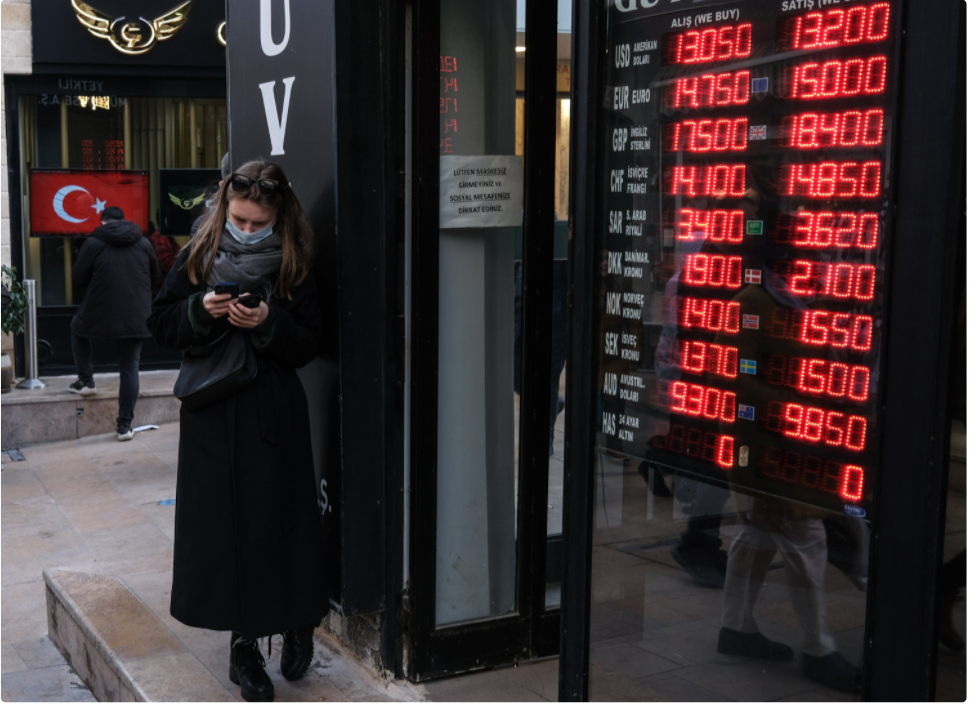Since the beginning of January, dollar/TL exchange rate has been “stuck” at a very narrow margin of 13.40-13.60, thanks to Central Bank (CBRT) and state banks selling dollars to the market to ease the pressure—CBRT denies selling any foreign currency. On Monday, amidst a global panic in risky assets, dollar/TL inched up only to 13.58-59, one of the least volatile currencies in the world.
It appears that the AKP government intends to keep the exchange rate “stable” until summer, when tourism revenues can take over the task. There is a strong and rising positive correlation between the exchange rate and inflation, suggesting that exchange rate intervention is now at the centerstage of combat against inflation, instead of rate hikes.
Ankara’s exchange rate stabilization plans might work, thanks to an ever-aggressive effort to convince companies and citizens to convert their FX holdings and gold to TL. However the Ukraine Crisis, which hits the economy via higher energy and grains prices is shaping up to be a new obstacle to currency stability.
Fed Interest Rate Hikes Will Hurt Turkish Economy (And Other Emerging Markets) Badly
Amberin Zaman at al Monitor writes: However, Turkey’s worries go beyond having to balance its NATO commitments with Russia, a key economic partner and since 2016 security partner in Syria. An actual war could have crippling consequences for Turkey’s battered economy.
The national currency, the lira, shed 44% of its value last year and spiraling inflation hit an annual 48.69%, the highest in two decades, according to official data released on Feb. 3.
Sharp hikes in utilities, notably electricity, have unleashed a wave of protests across the country amid power shortages and blackouts in major cities.
Russia Ukraine Conflict: Turkey Is Collateral Damage
“Commodity prices, particularly oil and gas, are a lead indicator for inflation and Turkey has struggled even without these headwinds due to the government’s eccentric policies regarding interest rates,” said a London-based banker who closely monitors Turkey. The banker, who requested anonymity, was referring to Erdogan’s stubborn refusal to raise interest rates based on the idea that it would fuel inflation, while most economists hold that the opposite is true.
“A Russian incursion or, worse still, a full-scale invasion,” the banker said, “would add further price pressure on commodity inputs, which would only spur more inflation.”
It was not surprising, the banker noted, that some Western banks were forecasting that the Turkish lira would slump to 20 to the dollar or even lower this year, “with the myriad of dangers that lie ahead and with Erdogan being seen to have played his last card on linkage of Turkish lira deposits to US dollar rates last year.”
Even Turkish experts are skeptical whether the concealed currency peg will hold. In CBRT’s January survey of economic expectations, the average dollar/TL rate turned out to be 16.00, implying a roughly 20% depreciation in the exchange rate.
Turkey expert Tim Ash pondered in his twitter feed whether excruciating economic pressure from Ukraine would compel Erdogan to drop his resistance to higher interest rates, allowing CBRT to hike them once again.
The stakes are incredibly high. Economic malaise and currency weakness caused AKP 7 percentage points in polls over a year, while in most recent polls Erdogan would lose to an opposition candidate, such as popular Istanbul mayor (CHP) Ekrem Imamoglu.
Follow our English language YouTube videos @ REAL TURKEY:
https://www.youtube.com/channel/UCKpFJB4GFiNkhmpVZQ_d9Rg
And content at Twitter: @AtillaEng
